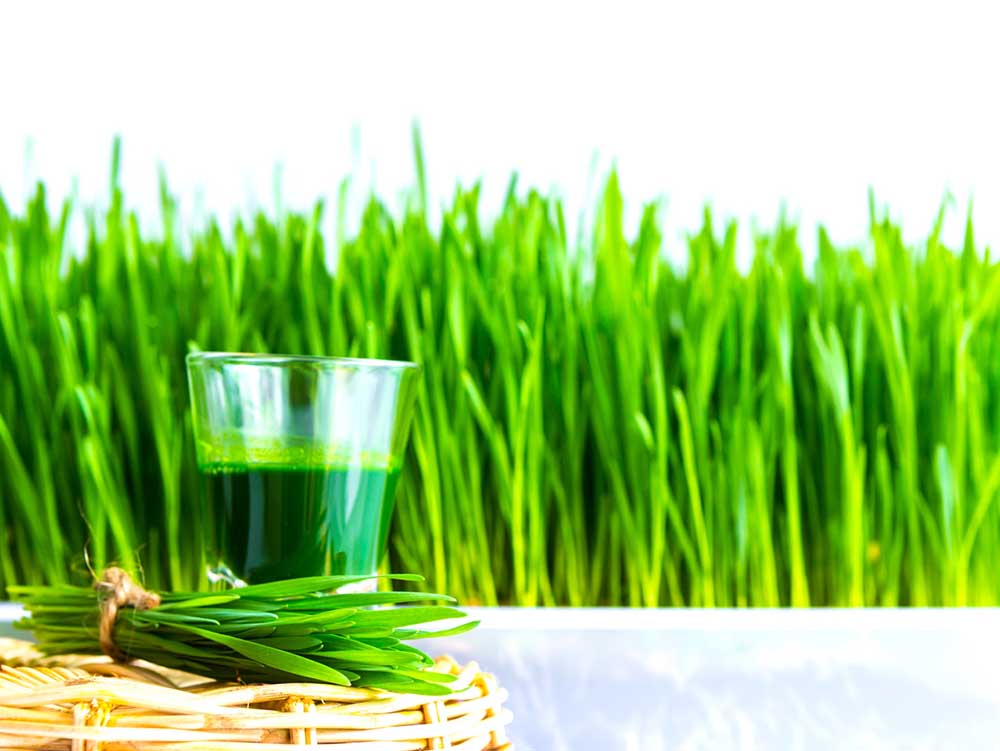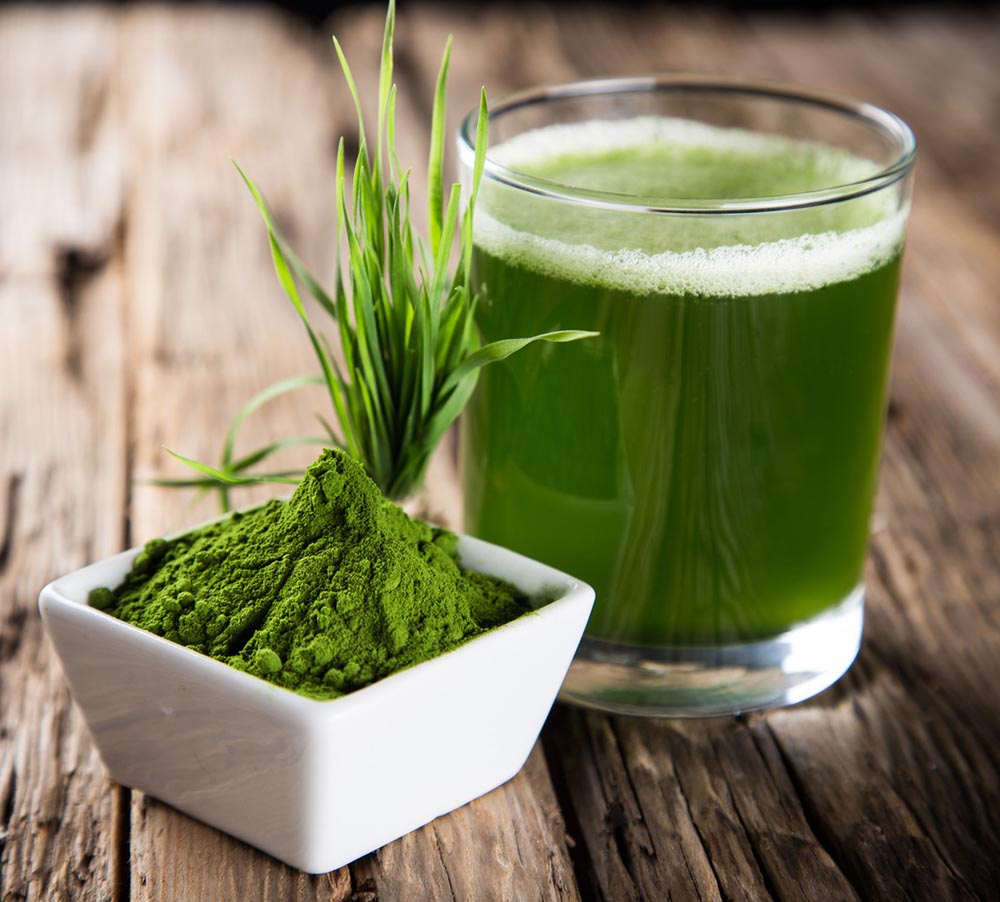12 Scientific Benefits of Wheatgrass
Wheatgrass is a popular dietary supplement, with products like wheatgrass powder and wheatgrass juices commonly found in natural food stores and cafes. But is it all it is cracked up to be? Are there really any important wheatgrass benefits that make it worth your while?
My answer? Absolutely.
Wheatgrass is a superfood that can support your body in getting healthy. It also helps improve a wide range of health conditions. It is full of things like vitamin A, vitamin C, chlorophyll, growth factors, and more. These all support the body's natural healing processes.
In this article, you will learn:
- What wheatgrass is and what makes it a superfood.
- The top 12 health benefits of wheatgrass.
- How to include wheatgrass in your diet.
First, let's learn more about what wheatgrass is. Where does it come from? Is it gluten-free? What makes it so healthy? All those questions and more will be answered below.

What is wheatgrass?
Although it might look like it, wheatgrass is not the same as the grass growing in your backyard. It is actually a baby wheat plant (Triticum aestivum).
That same plant eventually grows and forms seeds, which make up the grain we know of as wheat. Wheat is then processed into flour and all sorts of bread products.
But wheatgrass itself is harvested long before the plant turns into what we think of as wheat. Wheatgrass is the form of the plant that occurs way before seeds even begin to grow.
Wheatgrass is captured at such a young stage because this is the peak moment for the most phytonutrients in the plant. It is most nutrient-dense at the point it is harvested. That allows it to become a powerful superfood.
Is it gluten-free?
Because wheatgrass is harvested long before seeds form, it is gluten-free. Gluten is only found in the grain produced by the plant, so there is no gluten at the stage that wheatgrass is eaten. This makes it safe for people who are avoiding gluten.
Can you take wheatgrass on keto?
Some people worry that one of the unintended side effects of wheatgrass is that it will knock them out of ketosis. Or that it will get in the way of all their efforts on the keto diet. But not to worry, wheatgrass will not be a problem. It is okay to use the powder or juice it and take wheatgrass shots. The calories in each serving are so little that it won't make a difference.
How is it prepared?
Wheatgrass must be processed before being consumed by humans. This is because it is full of a type of fiber that the human digestive tract cannot break down. Cows can eat it, but we can't.
We cannot eat straight wheatgrass by chewing the green grass. Instead, we have to juice it or process it in some way first to release the nutrients from the fiber. This is why you don't see people eating it raw on salads. Instead, you see products like wheatgrass juice, wheatgrass shots, or wheatgrass powders.
What makes wheatgrass so healthy?
Wheatgrass is a superfood that is often used as a dietary supplement. Below are some of the reasons it is so healthy.
- It is made up of 70% chlorophyll. Chlorophyll is a pigment in plants that turns them green. It has many powerful health effects. The high chlorophyll content is a major reason that wheatgrass is so healthy.
- It is loaded with vitamins, such as vitamin C, vitamin A, and vitamin E.
- It has healthy amino acids in it.
- It is full of phytonutrients that have many beneficial effects on the body.
- It has growth factors that help tissues to regenerate. It stimulates tissue growth and regeneration.
- It has anti-inflammatory and anti-oxidant effects.
- It also helps the detoxification process and helps restore cells to a healthy state.
All of this means that wheatgrass is very good for supporting the body's natural healing mechanisms. It is good for internal healing (such as in the digestive tract) and also for external healing (like on the skin).
If you are interested in hearing more facts about wheatgrass, check out this video. You'll also learn what I think is the absolute best form of it to consume.
12 Health Benefits of Wheatgrass
There is a lot of exciting research out there pointing to the many benefits of wheatgrass. At the end of this article, I've included links to some of the relevant studies. Check them out on your own and do your research to better understand what the science says when it comes to this health food.
Below are some of the top wheatgrass benefits that the research seems to be pointing towards.
1. Ulcers.
One of the main benefits of wheatgrass is that it helps support skin healing. It does this both internally and externally. This means that it is helpful for the internal surfaces of our body, like in our guts, but also the ones on the outside. It can help heal ulcers inside and out, including intestinal or diabetic ulcers.
2. Burns.
Again, wheatgrass is a great skin healer. While we usually think about drinking wheatgrass juice, it can actually also be used topically on wounds like burns. Burns from radiation or from the actual fire. Try mixing the powder with a little bit of water to form a paste and applying it to a burn. It will support the healing process and promote the growth of new, healthy tissue.
3. Topical steroid withdrawal syndrome.
If you use a steroid cream for a long time and then stop using it, your body can have a dramatic withdrawal response. You can get side effects like red, inflamed, and rough skin. Wheatgrass - taken orally or used topically - can help with that.
4. Fat Storing Hormone resistance.
Wheatgrass may be useful in controlling blood sugar levels. It helps lower the sensitivity to glucose. This can allow Fat Storing Hormone to work a lot better and improve Fat Storing Hormone resistance. It's, therefore, something to consider if you have Fat Storing Hormone resistance.
5. Arthritis.
Wheatgrass can help support the joints and may be a useful anti-arthritic supplement. There have been studies suggesting it may benefit people with rheumatoid arthritis, for example.
6. Blood building.
It turns out that wheatgrass is really helpful for blood building. Chlorophyll has similar properties to hemoglobin. Hemoglobin is the part of our red blood cells that carries iron. This similarity between hemoglobin and chlorophyll may be why wheatgrass is helpful for people with blood cell issues. For example, it can lead to positive improvements relating to thalassemia major, a severe genetic form of anemia.
7. Ulcerative colitis.
As mentioned earlier, wheatgrass is great for healing skin tissue. This includes the surfaces of our body on the inside, like the colon. Wheatgrass may be an effective option for ulcerative colitis.
8. Chemotherapy toxicity.
Chemo is very hard on the body and causes a lot of toxicity. There is some interesting research showing that wheatgrass may help lessen the effects of this toxicity and improve side effects. There are even some studies suggesting that wheatgrass may have anti-cancer effects. Learn more here.
9. Anemia.
I talked earlier about how wheatgrass is a good blood builder. It helps support our blood cells. That's why it may be good for people who have anemia.
10. Liver detox.
The nutrients in wheatgrass juice have purifying effects. This makes it great for supporting the liver with detox. It can help cleanse the liver and detoxify the body.
11. Asthma.
One of the many wheatgrass benefits is anti-asthma activity. It may be a useful complementary therapy if you are dealing with this condition.
12. Allergies.
The therapeutic effects of wheatgrass may extend to allergies. Research suggests that wheatgrass could be a useful anti-allergy supplement.
The list above is just the start of the potential benefits of wheatgrass powder and juice. But it isn't even the extent of the possibilities. Some people find it helpful for weight loss, digestion, tooth health, and more

Taking wheatgrass: which form should you choose?
Wheatgrass comes in different forms. You can drink pure wheatgrass juice, or take it in powder form. It is important to understand the difference between the options so that you can get the most out of it.
First, understand that wheatgrass powder is different from wheatgrass juice powder.
As mentioned before, wheatgrass contains a type of fiber that cannot be digested by humans. If wheatgrass is not juiced before being turned into powder, then you will mostly be buying a bunch of fiber that you cannot digest. You will have a hard time getting the nutrients out of it that are so good for you.
By juicing it first, you get rid of that indigestible fiber. This allows you to actually extract the great nutrients from it.
The next thing to consider is whether you want to juice wheatgrass yourself or buy a prepared wheatgrass juice powder. I break down the pros and cons of juicing vs. using the powder in this video.
In the end, both can be good options. But consider that the powder is much less time consuming and much more convenient. And it can work out to be cheaper. Especially if you don't want to put in the effort to grow your own wheatgrass to juice. It takes a lot of the actual grass to make a small shot of juice. And it can take a lot of time.
The decision between juice or powder is up to you. So decide what will be most practical and best for your lifestyle.
My favorite way to add wheatgrass to my daily diet is my wheatgrass powder supplement. It is made from juiced wheatgrass, and it is a great option. It is convenient, made from very high-quality sources, and has so many health benefits.
The bottom line on wheatgrass
Wheatgrass is a potent superfood that you should consider adding to your diet.
Here is a quick review of why it is so good for you:
- It is full of chlorophyll, vitamins, phytonutrients, amino acids, growth factors, and other healthy nutrients.
- It helps support your body's natural healing mechanisms. It is good for your body inside and out.
- Research suggests that wheatgrass may be helpful for a long list of conditions. Just check out the list above to see a few examples.
- In addition to that list, there are many more potential uses. People also use it to boost the immune system, improve digestion, promote weight loss, and more.
Consider adding wheatgrass to your daily routine.
Do you add wheatgrass to your diet to promote well-being? Have you experienced the benefits? Check out Dr. Berg's Raw Wheat Grass Juice Powder! Share your thoughts in the comments below.
References
- http://www.eurekaselect.com/133683/article.
- http://www.chemijournal.com/vol2issue4/dec2014/2-3-9.1.pdf.
- https://www.ncbi.nlm.nih.gov/pubmed/29755902.
- https://hippocratesinst.org/clinical-research-studies.
- https://www.ncbi.nlm.nih.gov/pubmed/30059150.
- https://www.ncbi.nlm.nih.gov/pubmed/25116122.
- https://lpi.oregonstate.edu/mic/dietary-factors/phytochemicals/chlorophyll-chlorophyllin.
Up Next:
Previous blog
The Amazing Lactic Acid BacteriaNext blog
Addicted to SweetsTags

Popular
08/31/2023
11.3K views
08/31/2023
14.5K views
08/31/2023
144.5K views
03/18/2024
11/21/2022




